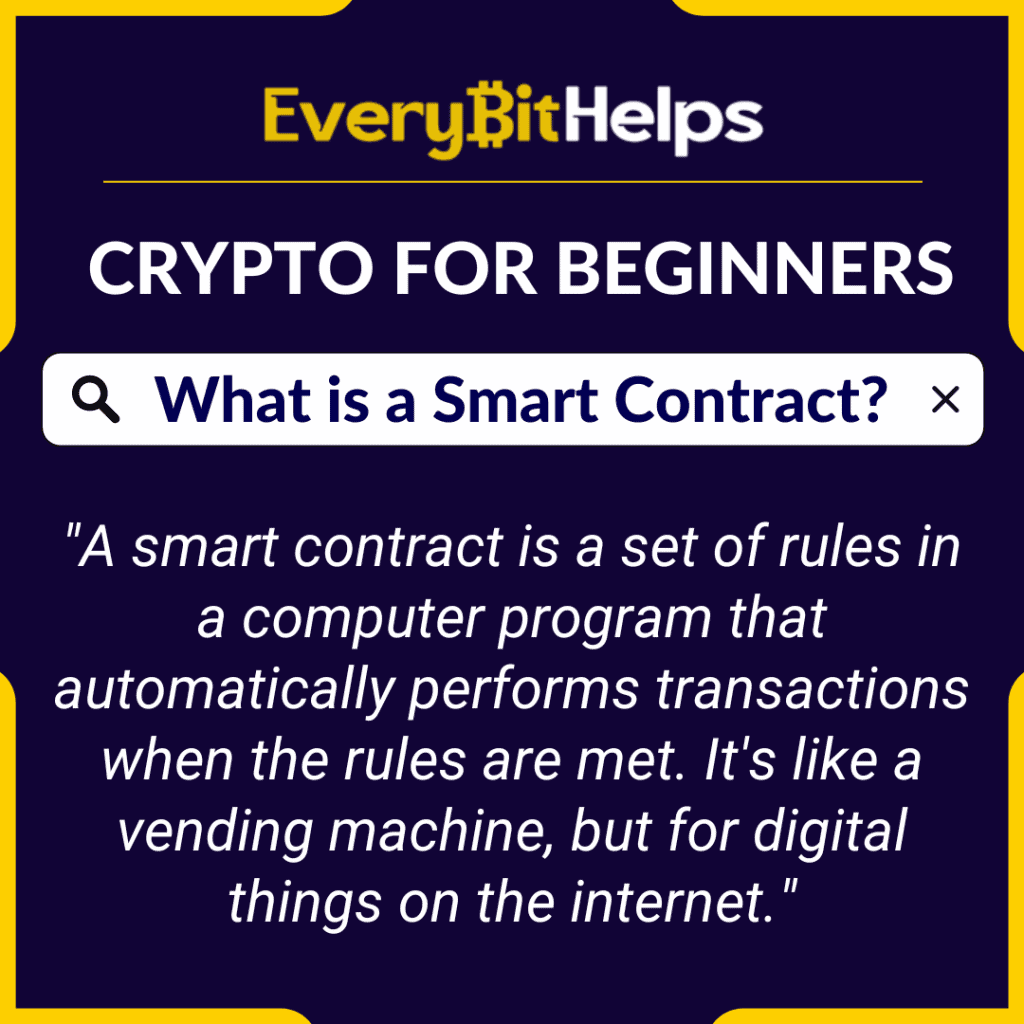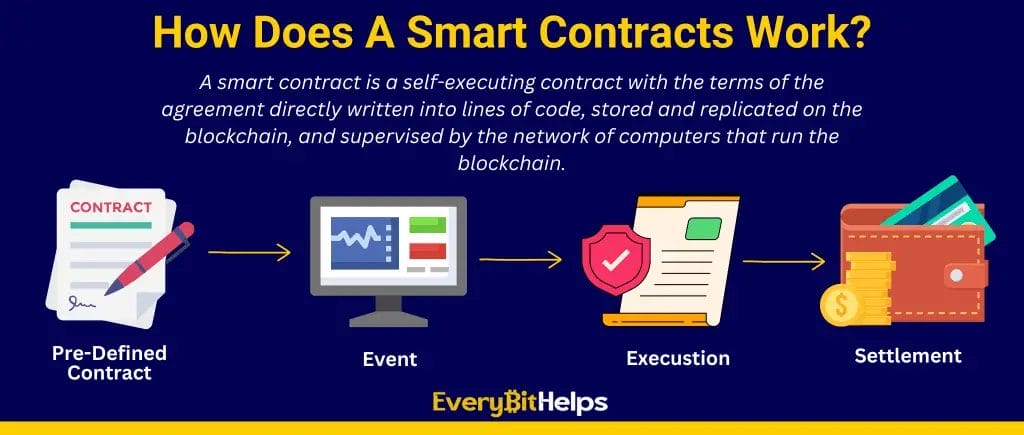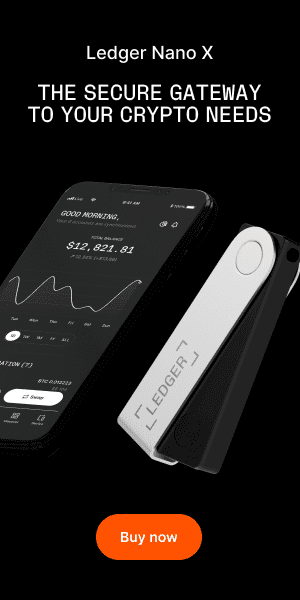Digital technology has revolutionized various aspects of our lives, and one area gaining significant attention is smart contracts. Smart Contracts are a cornerstone of blockchain technologies like Ethereum and Bitcoin, and it’s critical to grasp their concept.
If you’re new to smart contracts, this beginner-friendly guide is designed for you.
What is a Smart Contract?
Smart contracts revolutionize how we will perform transactions, making them possible without the need for any third-party interference. These automated digital contracts carry out the conditions of a mutual agreement among multiple participants. They streamline the agreement’s validation, control, and implementation entirely on a blockchain platform, eliminating the need for human interference.
Much like their traditional counterparts, smart contracts lay down the rules of the agreement and ensure the execution of responsibilities as per the commitments made. Essentially, a smart contract is a self-operational program that automates the actions that a contract or agreement necessitates. Once the transactions are performed, they become traceable and irreversible.
Smart contracts empower trustful transactions and agreements between distinct, anonymous parties without requiring a centralized authority, a legal framework, or external enforcement mechanism.
History of Smart Contracts
The concept of smart contracts came to life in the early 1990s, even before blockchain technology or Bitcoin. Nick Szabo, a renowned legal scholar and cryptographer, proposed this innovative idea. Szabo’s vision was to establish a digital protocol for users to enter contract agreements, which would be self-executing when certain conditions were met.
However, the full realization of smart contracts didn’t happen until a couple of decades later, with the rise of blockchain technology. In 2008, Bitcoin emerged, introducing the world to decentralized digital currency. However, Bitcoin’s blockchain did not support complex smart contracts.
This limitation was addressed in 2015 with the launch of Ethereum, a blockchain platform designed by Vitalik Buterin. Ethereum expanded the capabilities of smart contracts, allowing for more intricate and customizable contract agreements to be coded and executed on the blockchain. This opened up a world of new possibilities and use cases for smart contracts.
Since then, smart contracts have become a cornerstone feature of various blockchain platforms and have found use in numerous industries, from finance and real estate to healthcare and supply chain management. Their potential for facilitating secure, trustless, and efficient transactions has ensured their continued growth and evolution in the digital world.

How do Smart Contracts Work?
Smart contracts operate on a basic principle of cause and effect logic, similar to “if/when…then…” reasoning.
For instance, if Party A completes a certain task (Obligation B), Party B provides a specific object or service (Object A).
A helpful comparison would be a vending machine operation. The right amount of money and the correct snack selection must be made to obtain a snack from a vending machine. Like a smart contract, the vending machine automates a transaction, bypassing the need for a human vendor.
The parties involved outline the terms of the agreement, which are then converted into code and embedded in the blockchain. Upon fulfilling these pre-set conditions by all parties, a network of computers initiates the transaction as per the agreement. The blockchain then updates to reflect the completed transaction. This information remains unchangeable or ‘immutable’, and only the parties involved in the agreement can access the transaction’s outcome.
Though smart contracts offer the flexibility to establish your agreement’s terms, creating individual smart contracts for every agreement can be laborious. Hence, many developers and organizations offer templates to help you craft your contract terms more conveniently.

Popular Smart Contract Platforms
Several platforms have emerged over the years that facilitate the creation and execution of smart contracts. These platforms continue to drive innovation in smart contract development, each offering unique features and capabilities, making the landscape of smart contract technology incredibly diverse and full of potential.
Here are some of the most popular smart contract platforms:
- Ethereum
Often considered the birthplace of modern smart contracts, Ethereum is a decentralized platform that enables developers to build and deploy smart contracts. Ethereum’s native programming language, Solidity, was specifically designed for creating complex smart contracts. - Cardano
Cardano, like Ethereum, also supports the development of smart contracts. Cardano aims to address some of Ethereum’s limitations, such as scalability and energy efficiency, making it an attractive alternative for developers and businesses. - Binance Smart Chain (BSC)
BSC is an innovative platform developed by Binance, the world’s largest cryptocurrency exchange. It offers a high-performance, low-fee environment for creating smart contracts compatible with Ethereum’s programming languages and tools. - Polkadot
Polkadot is a multi-chain platform that supports cross-chain transfers of any type of data or asset, including smart contracts. Its unique architecture allows different blockchains to interact while maintaining their security. - NEO
Often dubbed the “Chinese Ethereum”, NEO supports various programming languages for smart contract development. It also focuses on digital identities and digitizing real-world assets, extending the possibilities for smart contracts. - Tezos
Tezos is a self-amending cryptographic ledger that supports smart contracts. It allows its users to directly control the rules of the network, which includes upgrading the protocol over time.
What are the Benefits of Smart Contracts?
While smart contracts may seem a bit complex at first glance, their benefits are clear and practical, significantly transforming the landscape of digital transactions and agreements. From establishing trust and transparency to enhancing efficiency and reducing costs, the perks of smart contracts are numerous and multi-dimensional.
So, what makes smart contracts such a game-changer? Let’s delve into the key benefits that these self-executing digital agreements bring to the table.
Trustworthiness and Openness
Smart contracts function autonomously, with no third-party involvement in the contract’s execution. All participants receive the encrypted details of the agreement, providing a safeguard against data manipulation for personal gain and ensuring a high level of transparency.
Robust Security
Since smart contracts are deployed on blockchain platforms, they offer a high degree of security. All transaction details are encrypted and immutable, protecting them from malevolent attempts. The interconnected nature of transaction records on the blockchain further enhances data security.
Precision, Swiftness, and Efficacy
Smart contracts are automated and programmed to execute transactions once the predetermined terms are met. This ensures not only speed but also precise and effective processing, eliminating paperwork or the need for third-party involvement.
Cost Reduction
Smart contracts can efficiently digitize and classify traditional paper contracts, streamlining administration and management. This standardization of contract management minimizes risk and thus results in significant cost savings. Consistent adherence to standards within your contracts reduces financial liability and the risk of costly compliance failures.
These advantages position smart contracts as a preferred solution across diverse economic sectors, including governmental voting systems, healthcare, financial services, and supply chains. Smart contracts hold the potential to elevate security, streamline efficiency, and reduce production costs significantly.
9 Use Cases for Smart Contracts
Smart contracts, with their capability to automate agreements and transactions, have carved a unique niche for themselves in the digital realm. Their applications are not restricted to a single industry but span many sectors.
These innovative, self-executing agreements bring profound changes wherever they’re implemented, enhancing efficiency, boosting transparency, and securing processes.
Let’s look at ten diverse fields where smart contracts are not just a technical novelty but a functional revolution.
1. Financial Services
In the financial realm, smart contracts contribute to streamlining various transactions, such as payments, loans, and insurance claims. They facilitate rapid, secure, and transparent processes, effectively reducing human errors and improving overall efficiency..
2. Real Estate
Smart contracts simplify property transactions by automatically transferring ownership once payments are made. This automation significantly curtails paperwork, fraud risks, and overall costs associated with traditional processes.
3. Supply Chain Management
In the logistics sector, smart contracts can bolster transparency and traceability. They automate the verification of each phase, right from production to the final delivery, ensuring seamless tracking and improved accountability.
4. Healthcare
Smart contracts provide a secure medium to store and share patient data across multiple healthcare providers within the healthcare sector. It ensures patients control their personal information while enabling better coordination among providers.
5. Voting Systems
Smart contracts can revolutionize voting systems by creating a transparent and tamper-proof platform. They automatically validate and tally votes, paving the way for secure and fair elections.
6. Intellectual Property Rights
For artists and content creators, smart contracts offer an efficient way to manage royalties. A smart contract can automatically transfer the payment whenever their work is used, ensuring fair compensation.
7. Internet of Things (IoT)
IoT devices can use smart contracts to automate an array of processes. For instance, a smart lock could automatically unlock upon receiving payment, or a smart vehicle could autonomously manage its leasing process.
8. Legal Industry
Smart contracts can potentially upend the legal industry by automating the enforcement of contractual obligations. This can reduce the reliance on legal intermediaries, resulting in cost savings and increased efficiency.
9. Decentralized Autonomous Organizations (DAOs)
DAOs utilize smart contracts to encode their rules and decision-making procedures. This ensures automatic enforcement of these rules, fostering a more autonomous and efficient operation.
10. Education
An emerging use case for smart contracts is in the education sector. Schools and universities can utilize them for enrollment, verification of degrees, and even for disbursement of scholarships. This can reduce bureaucratic hurdles, enhance transparency, and ensure timely processing.
Will Smart Contracts Create New Jobs?
The rise of smart contracts is expected to create numerous new job opportunities in web3. As businesses and industries begin recognising the potential benefits of blockchain technology and smart contracts, there’s a growing demand for professionals skilled in these areas.
Here are a few examples of job opportunities created by smart contracts:
- Smart Contract Developers: With an increase in the use of smart contracts, there’s a growing demand for developers who can write and audit smart contract code. These professionals need a solid understanding of Web3 technology and programming languages like Solidity (for Ethereum-based smart contracts).
- Blockchain Consultants: As organizations explore the possibilities of implementing smart contracts, they require the expertise of consultants who understand blockchain technology and can guide them on how to best incorporate smart contracts into their operations.
- Legal Tech Professionals: Smart contracts have implications for the legal aspects of transactions. Legal professionals with an understanding of smart contracts will be sought after to provide advice on regulatory compliance and contract law and to resolve disputes related to smart contracts.
- Smart Contract Auditors: Given the immutable nature of smart contracts, the code must be error-free before deployment. Auditors scrutinize smart contracts to identify and fix potential vulnerabilities, making this another growing field.
- Business Analysts: Professionals who can analyze and define business requirements for smart contract applications will also be in demand. They act as a bridge between developers and non-technical stakeholders, ensuring the solutions meet business needs.
So, not only will smart contracts create new job roles, but they’ll also redefine existing ones, demanding new skills and expertise in blockchain technology.
Conclusion
As we delve deeper into the digital era, smart contracts are an ingenious solution for a more secure, transparent, and efficient way of managing transactions and agreements. The widespread use of smart contracts is just on the horizon, promising to revolutionize various sectors – from finance and real estate to healthcare, supply chain, and beyond.
Soon, we can anticipate smart contracts becoming an integral part of our lives, streamlining our everyday transactions, enhancing trust, and minimizing intermediaries. As blockchain technology evolves, the potential for smart contracts only broadens, promising to shape an unprecedented era of digital transactions and agreements.
FAQs
How do people make money from smart contracts?
People can profit from smart contracts in various ways, depending on their role and the nature of the contract. For example:
Developers: Skilled individuals who know how to write and deploy smart contracts can earn money by providing services to individuals or businesses in need. This could include creating unique smart contracts for specific purposes or building decentralized applications (dApps) that utilize smart contracts.
Investors or Traders: Some people earn money by participating in DeFi (Decentralized Finance) platforms, which heavily utilize smart contracts. These platforms offer yield farming, staking, and liquidity mining services, where participants can earn interest or tokens.
Businesses: Companies can use smart contracts to automate processes, increasing efficiency and reducing costs. The saved expenses indirectly translate into earnings.
Do you need a smart contract for NFT?
Yes, NFTs (Non-Fungible Tokens) are typically created and managed through smart contracts. When an NFT is created, known as minting, a smart contract is deployed on the blockchain. This contract contains the rules and unique information about the NFT and who owns it.
What is a smart contract vs blockchain?
A blockchain is a decentralized, distributed ledger that records transactions across many computers so that the registered transactions cannot be altered retroactively. It serves as the underlying technology for various digital innovations, including cryptocurrencies like Bitcoin and Ethereum.
On the other hand, a smart contract is a self-executing contract with the terms of the agreement directly written into lines of code. It lives on the blockchain and automatically executes transactions once certain pre-set conditions are met.
So, while blockchain is the underlying technology providing the environment and security for various digital interactions, smart contracts are one of the applications that operate on top of the blockchain, utilizing its decentralization and security features to execute automated, trustless transactions.
How to make money with Ethereum smart contracts?
Ethereum smart contracts present several avenues to potentially earn money. Remember, while these methods can be profitable, they also come with risks. It’s essential to thoroughly research and understand what you’re getting into before you start. Here are a few examples:
1. Decentralized Finance (DeFi): This is arguably one of the most popular ways to make money with Ethereum smart contracts. You can lend crypto assets on DeFi platforms like Compound or Aave and earn interest.
2. Yield Farming: You can use yield farming opportunities in DeFi. Here, you provide liquidity to a DeFi protocol and earn returns as tokens.
3. Staking: With Ethereum 2.0 and its Proof of Stake (PoS) mechanism, you can stake your Ether (ETH) and earn rewards. Remember, staking involves locking up your tokens, and certain risks and requirements might be involved.
4. Creating and Selling NFTs: With your creativity and Ethereum smart contracts, you can create unique digital assets or NFTs (Non-Fungible Tokens) and sell them on platforms like OpenSea or Rarible.
5. Developing DApps: If you’re a developer, you can build decentralized applications (DApps) or new DeFi protocols that leverage Ethereum smart contracts. Successful DApps could generate revenue through transaction fees or their native tokens.


